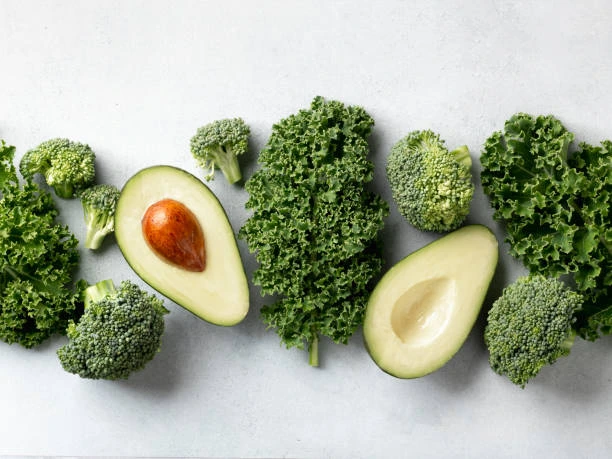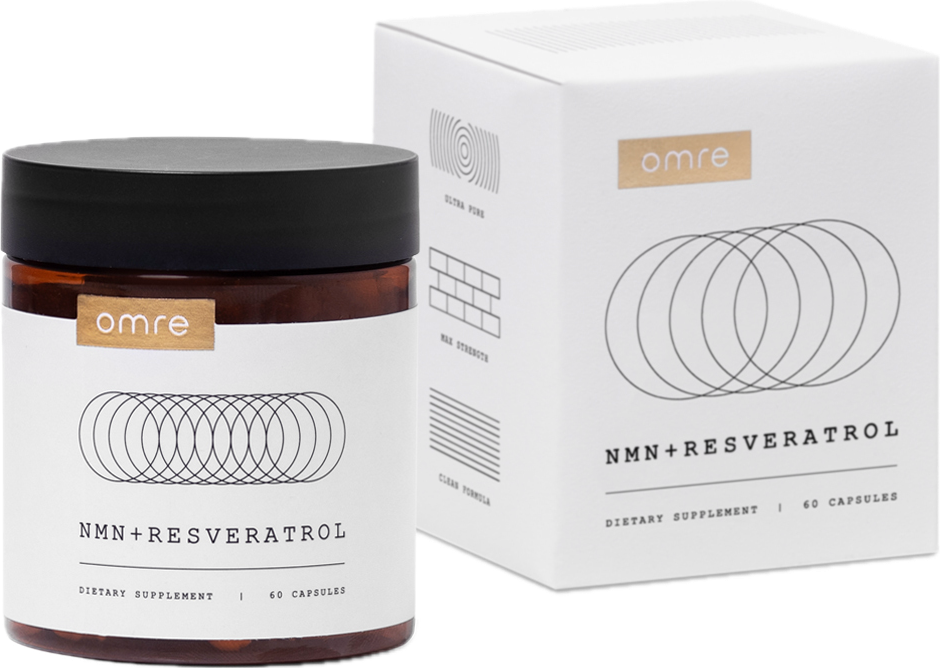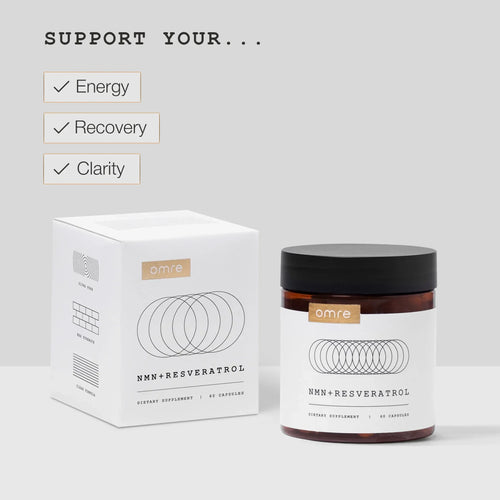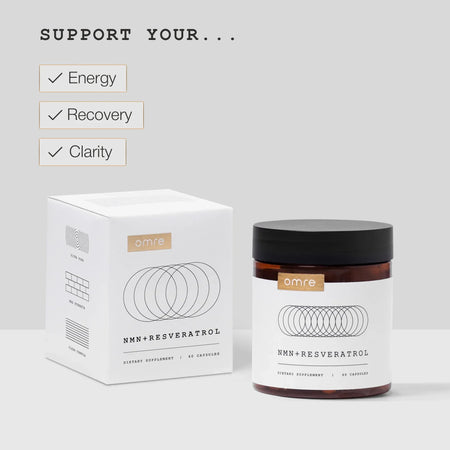Table of Contents
- What is NMN?
- How Does NMN Work in the Body?
- What is NAD?
- How Does NAD Work in the Body?
- What are the Potential Benefits of NMN and NAD?
- NMN Vs. NAD: What Are the Key Differences?
- What are the Similarities between NMN and NAD?
- NMN vs NAD: Which One Is Better?
- Why NMN Works Better than NAD
- How to Choose the Right Supplement
- Conclusion
When it comes to fighting aging and maintaining energy, NMN and NAD have taken the spotlight. Both are pivotal to cellular health, but which one truly delivers better results?
The answer lies in understanding how they work and why one may outperform the other.
NMN, a powerful precursor to NAD+, may hold the key to long-term vitality and efficient cellular repair. Read on to learn why experts and science point to NMN as the better choice.
What is NMN?
 NMN, short for nicotinamide mononucleotide, is a naturally occurring compound and a precursor to NAD+. It plays a vital role in boosting NAD+ levels in cells, which is essential for energy production, DNA repair, and healthy aging.
NMN, short for nicotinamide mononucleotide, is a naturally occurring compound and a precursor to NAD+. It plays a vital role in boosting NAD+ levels in cells, which is essential for energy production, DNA repair, and healthy aging.
NMN is like the raw material your body uses to create NAD+, a coenzyme critical for countless biological processes. Found naturally in small amounts in foods like broccoli, avocado, and cabbage, NMN has become a popular supplement for those looking to support cellular health and combat age-related decline.
Research suggests that NMN supplementation can improve mitochondrial function, the "powerhouses" of your cells, while supporting processes like DNA repair and metabolism (1).
It works seamlessly within your body’s systems to maintain and replenish NAD+, which naturally declines as you age. This decline has been linked to fatigue, decreased cognitive function, and various age-related conditions.
NMN + RESVERATROL
Cellular NAD+ booster with ultra‑pure NMN and Resveratrol, at research‑backed doses.*
How Does NMN Work in the Body?
NMN works by entering cells through specialized transporters and converting into NAD+, a molecule vital for cellular energy, DNA repair, and metabolic health.
Think of NMN as the fuel your body needs to keep its cellular machinery running smoothly. Once inside your cells, NMN is converted into NAD+ through enzymatic reactions.
This process is highly efficient due to NMN’s ability to pass through cell membranes using specific transport proteins.
By replenishing NAD+ levels, NMN supports critical processes like ATP production (the energy currency of cells), activation of sirtuins (proteins linked to longevity), and DNA repair.
This makes NMN an excellent option for anyone looking to address age-related issues or maintain their vitality. Studies have highlighted its potential to improve insulin sensitivity, physical performance, and even cognitive health over time (2, 3, 4).
In summary, NMN is the direct precursor to NAD. Our cells use NMN+ to make NAD+
What is NAD?
NAD, or nicotinamide adenine dinucleotide, is a coenzyme found in all living cells that drives energy production, DNA repair, and metabolic processes.
NAD is like a master switch for your body’s energy and repair systems. It shuttles electrons during cellular respiration, a process that transforms nutrients into usable energy.
NAD also helps activate enzymes responsible for repairing damaged DNA and regulating gene expression.
While your body naturally produces NAD, levels decline significantly with age, stress, and poor lifestyle habits. This decline has been linked to chronic conditions such as heart disease, diabetes, and neurodegenerative disorders.
Supplementing with NAD can theoretically address this decline, but its larger molecular size makes absorption into cells a challenge. That’s why if you want to boost NAD+ levels, taking a precursor like NMN is key.
How Does NAD Work in the Body?
NAD works as a coenzyme by transferring electrons during energy production and activating enzymes for DNA repair and metabolic regulation.
NAD essentially acts as a cellular workhorse, facilitating energy production through its role in the electron transport chain. This process generates ATP, which powers nearly every function in your body.
Additionally, NAD activates sirtuins, proteins that help regulate inflammation, metabolism, and aging. It also supports DNA repair enzymes, such as PARPs, which fix genetic damage caused by stress or environmental factors.
However, due to its poor absorption as a supplement, NAD often needs precursors like NMN to be effective in elevating cellular levels.
What are the Potential Benefits of NMN and NAD?
Since NMN is a precursor to NAD+, the benefits of both supplements are largely similar. By increasing NAD+ levels, they may support energy metabolism, DNA repair, and healthy aging. However, NMN has a significant edge—it’s better absorbed, works more efficiently, and has been studied more extensively.
As Professor Andrew Salzman, MD, explains, “It can’t be done by delivering NAD either orally or by IV… It can be done by providing the starting material for NAD, which is NMN.”
Potential Benefits of NMN
-v1735326477660.webp) NMN has gained attention for its role in increasing NAD+ levels, which may offer a range of potential health benefits. While research is promising, it’s important to approach these benefits with an open mind, as individual results can vary, and many studies have been performed on animals and small lab tests.
NMN has gained attention for its role in increasing NAD+ levels, which may offer a range of potential health benefits. While research is promising, it’s important to approach these benefits with an open mind, as individual results can vary, and many studies have been performed on animals and small lab tests.
May Support Energy Production: NMN might help improve how your cells produce energy by enhancing mitochondrial function. By replenishing NAD+, it supports ATP production, which could leave you feeling more energized and productive during the day (5).
Might Promote DNA Repair: Studies suggest that NMN could activate enzymes involved in repairing damaged DNA. This process may contribute to healthier aging by protecting cells from dysfunction over time (6).
May Improve Insulin Sensitivity: Some research indicates that NMN supplementation might support muscle insulin sensitivity, which could benefit those at risk of developing metabolic concerns like type 2 diabetes (7).
- Might Enhance Physical Performance: Animal studies and human trials hint that NMN could improve endurance and muscle strength, especially in older adults. This makes it an interesting option for those wanting to stay active and maintain their mobility (8).
May Support Brain Health: NAD+ is thought to protect neurons from oxidative stress, which might improve cognitive function. NMN’s ability to increase NAD+ could potentially help with focus, memory, and overall brain health (9).
Could Promote Cardiovascular Health: Early animal studies suggest that NAD+ might reduce age-related arterial damage, which may help support better circulation and a healthier heart. NMN’s role in boosting NAD+ could be beneficial here (10).
- Might Help with Aging-Related Decline: As NAD+ levels naturally drop with age, NMN supplementation may help restore these levels, supporting cellular repair and energy production (11). This might slow some effects of aging and help maintain vitality.
NMN Vs. NAD: What Are the Key Differences?
NMN and NAD are closely connected, but the key difference lies in their roles and absorption. NMN is a precursor that converts into NAD+, while NAD is the coenzyme itself. NMN is absorbed more efficiently by cells, making it the preferred option for supplementation.
Role in the Body
NMN: Acts as a building block for NAD+, providing the raw materials cells need to produce this vital coenzyme.
NAD: Functions as a finished product involved directly in cellular energy production, DNA repair, and other metabolic processes.
While both are necessary, NMN works upstream by replenishing NAD+ levels, while NAD is the active player in cellular processes.
Absorption and Bioavailability
NMN: Easily absorbed into cells through specialized transporters, making it highly bioavailable.
NAD: Too large to enter cells directly, requiring breakdown into smaller molecules like NMN or NR before being used.
This difference in absorption gives NMN a significant edge as a supplement, as it supports a more direct and efficient increase in NAD+ levels.
Supplementation Benefits
NMN: Provides a gradual and sustained increase in NAD+ within cells, supporting long-term cellular health.
NAD: Offers rapid but short-lived increases in NAD+ levels in the bloodstream, which may be useful for acute needs like recovery from stress.
NMN’s consistent support for cellular processes makes it better suited for addressing age-related decline.
NMN + RESVERATROL
Cellular NAD+ booster with ultra‑pure NMN and Resveratrol, at research‑backed doses.*
What are the Similarities between NMN and NAD?
NMN and NAD are connected by their shared role in cellular health, as NMN converts into NAD+ to support energy production, DNA repair, and healthy aging. Both contribute to vital processes that keep cells functioning at their best.
NMN and NAD may seem different at first glance, but they work hand-in-hand to support your body. Without NMN, your body wouldn’t have the raw materials to produce NAD+.
Together, they play a key role in cellular energy production, metabolic health, and longevity.
Here are their main similarities:
Both support energy production by aiding mitochondrial function.
Both are involved in DNA repair and cellular maintenance.
Both decline naturally with age, which impacts overall health and vitality.
These shared functions explain why increasing NAD+ levels—through NMN or NAD supplementation—is so important for maintaining optimal health.
NMN vs NAD: Which One Is Better?
NMN is the better choice for supplementation because it is more easily absorbed by cells and effectively increases NAD+ levels. It’s also supported by more scientific research, making it a more reliable option for long-term cellular health.
While both NMN and NAD contribute to maintaining healthy cells, NMN stands out because of its superior bioavailability. Unlike NAD, which struggles to cross cell membranes intact, NMN enters cells efficiently through specialized transporters.
Once inside, it’s quickly converted into NAD+, supporting essential processes like energy production and DNA repair.
Additionally, NMN has been the focus of more research, with studies showing its potential benefits for aging, physical performance, and insulin sensitivity.
These findings make it the go-to supplement for anyone looking to support their cellular health in a consistent and effective way.
Why NMN Works Better than NAD
NMN works better than NAD because it is directly absorbed into cells and converted into NAD+ efficiently. NAD supplements, on the other hand, are too large to enter cells as they are and must first break down into smaller components like NMN or NR. This extra step makes NAD less effective for supplementation.
Once inside the cells, NMN is quickly converted into NAD+, supporting energy production, DNA repair, and other essential cellular functions. Its direct absorption and conversion process give NMN a clear advantage, making it a more reliable option for maintaining cellular health and addressing age-related NAD+ decline.
Now that you understand why NMN stands out, let’s discuss how to choose the right supplement.
How to Choose the Right Supplement
Choosing a supplement doesn’t need to feel overwhelming. It comes down to focusing on quality, transparency, and how well the product supports your health goals. A great supplement doesn’t hide behind fancy claims—it delivers what your body actually needs.
Here are some key criteria to choose the best supplement:
Purity: Look for products with stated purity levels, like 99% pure NMN, to avoid fillers and unknown ingredients.
Dosage: Make sure the dosages match those used in research studies and are clearly listed on the label.
Transparency: Choose products that disclose all ingredients and avoid unnecessary additives.
Third-Party Testing: Look for supplements tested for contaminants like heavy metals or bacteria.
Manufacturing Standards: Opt for products made in GMP-certified and FDA-registered facilities.
Enhanced Absorption: Supplements with ingredients like BioPerine® can significantly improve how well your body absorbs them.
With these in mind, let’s explore Omre NMN + Resveratrol, a supplement that checks all the boxes.
Omre NMN + Resveratrol combines 99% purity NMN and 98% purity micronized Resveratrol to support NAD+ production and overall cellular health. Each serving provides 500mg of NMN and 500mg of Resveratrol, ensuring you’re getting a scientifically-backed dose.
The formula also includes 5mg of BioPerine®, a black pepper extract that enhances Resveratrol’s absorption by up to 10 times.
What makes this supplement stand out is its clean, filler-free formulation. Every ingredient serves a purpose, and the attention to quality is unmatched.
NMN replenishes NAD+ levels, while Resveratrol activates sirtuins to amplify NAD+ utilization and support cellular repair.
Together, they work as a powerful team to address aging and maintain vitality at the cellular level. If you’re looking for a reliable, effective supplement, this one is worth considering.
Conclusion
NMN and NAD are both essential for maintaining cellular health, energy production, and DNA repair. While they share similar benefits, NMN outshines NAD as a supplement due to its superior absorption and ability to support sustained NAD+ levels.
Pairing NMN with Resveratrol adds an extra layer of effectiveness, activating sirtuins and enhancing cellular repair.
If you’re considering adding a high-quality supplement to your routine, Omre NMN + Resveratrol offers purity, effective doses, and unmatched synergy between its ingredients.  Check availability today and take the first step toward supporting your cellular health.
Check availability today and take the first step toward supporting your cellular health.





